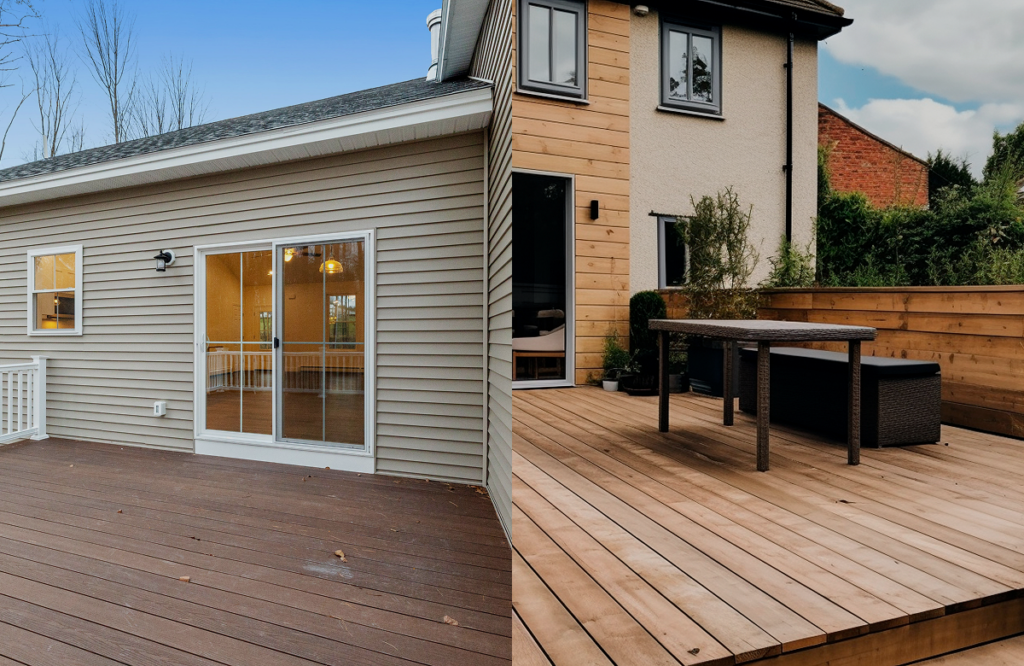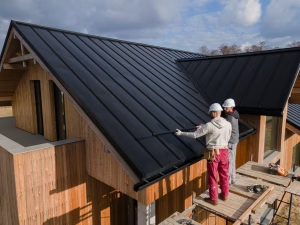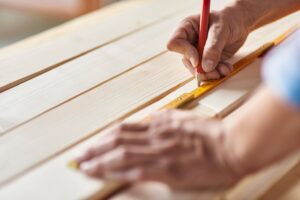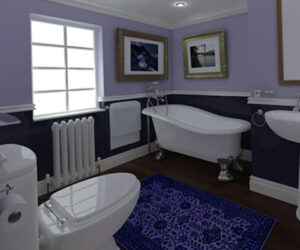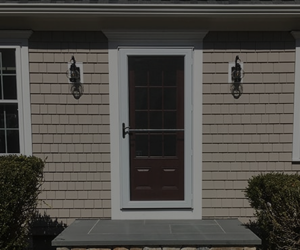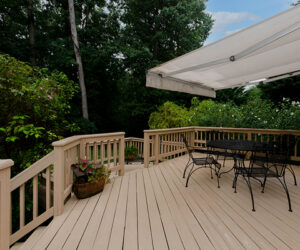Building a new deck? Great!, But before you get too excited about BBQ parties and summer sunsets, choosing between a wood deck vs a composite deck is a major decision, more than just a material choice. You may like the rustic beauty of natural wood or prefer the clean, low-maintenance look of a composite.
In any case, having a complete picture will help you make the best decision possible.
Understanding the Basics of Deck building:
What is a Wood Deck?
A wood deck is traditionally made from:
• Pressure-treated lumber (most affordable)
• Cedar or redwood (naturally rot-resistant)
• Hardwoods like ipe (durable, luxurious, and expensive)
Natural wood offers a warm, organic look that many homeowners adore. However, it comes with the need for regular sealing, staining, and cleaning to prevent warping, fading, and decay.
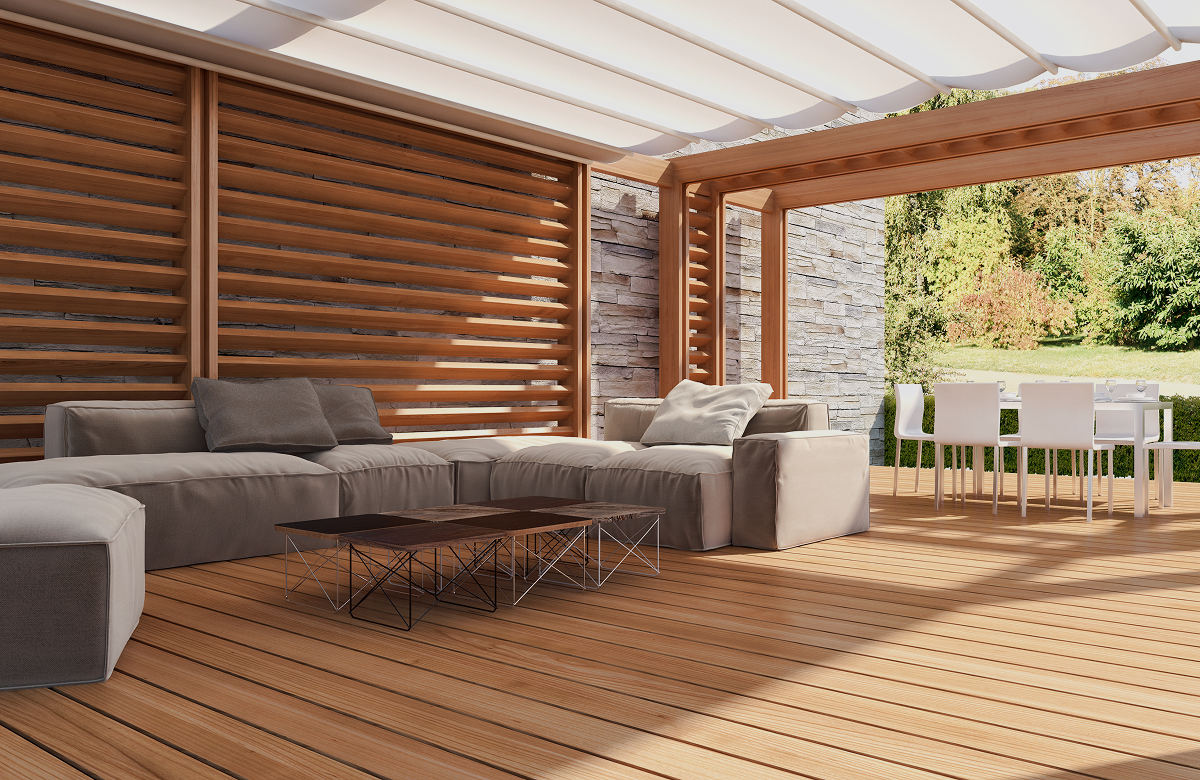
What is a Composite Deck?
Composite decking is an engineered product made of:
• Recycled plastic
• Wood fibers or sawdust
• Binding resins and protective additives
It mimics the appearance of wood but is designed to be fade-resistant, weatherproof, and splinter-free. Brands like Trex, TimberTech, and Fiberon lead the market with high-performance, eco-friendly solutions.
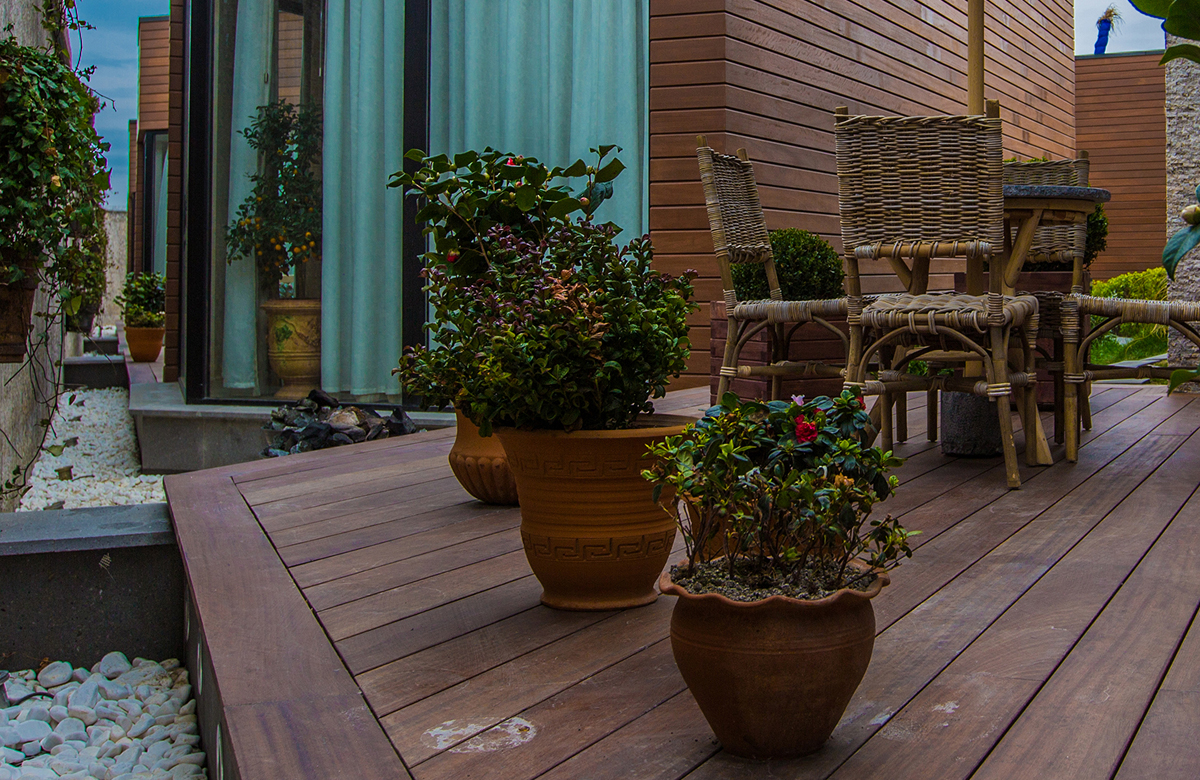
1. Wood Deck vs Composite Deck: Aesthetics & Appearance
Wood: Nothing beats the grain, texture, and aging of real wood. It can be stained or painted in any color, offering endless customization.
Composite: Offers a uniform appearance and comes in a variety of finishes and colors. Advanced embossing techniques make it look remarkably like wood, though purists may still notice the difference.
Verdict: If visual authenticity is your top priority, wood wins. If consistency and color retention matter more, composite takes the prize.
2. Durability & Lifespan
Wood: Lifespan ranges from 10 to 15 years, depending on climate and maintenance. Vulnerable to rot, pests, splintering, and UV damage.
Composite: Can last 25 to 30+ years with minimal upkeep. Resistant to warping, insects, mold, and fading.
Verdict: Composite decking is hands down more durable, especially in wet or coastal climates.
3. Maintenance Requirements
Wood:
• Annual sealing or staining
• Power washing every 1–2 years
• Replacing warped or cracked boards
Composite:
• Occasional cleaning with soap and water
• No staining, painting, or sealing
• Resistant to most weather damage
Verdict: Composite is the clear winner for homeowners who want a low-maintenance deck.
4. Cost of Wood vs Composite Decking
Cost Element | Wood Deck | Composite Deck |
Initial Cost (avg) | $15–$25/sq ft | $25–$45/sq ft |
Annual Maintenance | $100–$300 | $0–$50 |
Lifespan | 10–15 years | 25–30+ years |
Replacement Cost | Likely after 15 years | Rarely needed before 30+ |
Verdict: Wood is cheaper up front. Composite is more cost-effective in the long run.
5. Environmental Impact
Wood: If sourced responsibly (FSC-certified), wood can be sustainable. However, repeated chemical treatments and shorter lifespan reduce its eco-value.
Composite: Made from recycled plastics and wood waste. Manufacturing can use more energy but helps reduce landfill waste.
Verdict: Composite decks are increasingly more eco-friendly due to their use of recycled materials.

6. Installation: DIY or Hire Out?
Wood: Easier to cut, shape, and install for DIYers. More forgiving if mistakes are made.
Composite: Requires specialized tools and hidden fasteners. Precision installation is key to long-term performance.
Verdict: Wood is DIY-friendly. Composite is best left to professionals unless you’re very experienced.
Don’t know where to start? Read How to Design & Build a Deck – Complete Guide 2025
7. Safety and Comfort
Wood:
• Can splinter over time
• Cooler underfoot in the sun
• Slippery when wet unless treated
Composite:
• Splinter-free and smoother
• Some colors can get hot in the sunlight
• Usually has textured surfaces for grip
Verdict: Composite is safer, especially for kids and pets.
8. Customization and Design Flexibility
Wood: Highly customizable—cut to any shape, painted or stained in any color.
Composite: Limited to factory-made colors and styles. Cannot be stained or painted after installation.
Verdict: If you love design freedom, wood is better. Composite wins for “install it and forget it.”
9. Resale Value and Buyer Appeal
Wood: Appeals to traditional buyers who love authenticity.
Composite: Appeals to modern buyers who value sustainability and low maintenance.
Verdict: Both add value, but composite decks are trending in newer markets and eco-conscious areas.
10. Weather and Climate Suitability
Wood: Performs better in dry, moderate climates. Moisture and UV exposure can degrade untreated wood fast.
Composite: Best in humid, wet, or coastal climates due to its mold and moisture resistance.
Verdict: Let your climate guide you—composite for wet climates, wood for dry ones.
Composite decking, is typically the best deck material for Cape Cod decks. This is because it offers superior durability, requires minimal maintenance, and effectively resists the damaging effects of moisture and salty air.
11. Longevity and Warranty
Wood: Few manufacturers offer warranties. Lifespan heavily depends on care.
Composite: Warranties often range from 25 to 50 years, with many offering fade and stain coverage.
Verdict: Composite gives you peace of mind with strong warranty coverage.
Wood or Composite Deck: Which Should You Choose?
Choosing between a wood deck vs a composite deck comes down to your personal priorities:
• Love the warmth and character of natural materials? Go with wood.
• Want long-lasting beauty and low maintenance? Composite is the way to go.
Always consider your budget, climate, aesthetic preference, and how much maintenance you’re willing to do. A deck is a long-term investment—choose the material that aligns with how you live and enjoy your outdoor space.
Looking for the Best Deck Building Contractors?
Choosing the right material is only half the battle—working with experienced, professional deck builders ensures your vision becomes a reality. Whether you’ve decided on the timeless charm of wood or the hassle-free performance of composite, expert installation makes all the difference in durability, safety, and long-term satisfaction.
Hire us as your trusted deck building contractors in Cape Cod—we specialize in both wood and composite decking and deliver high-quality craftsmanship tailored to your needs. From design to installation, Dream Home Improvement LLC takes pride in creating indoor & outdoor spaces (all kinds of home additions) that are built to last and designed to impress.
FAQs: Wood vs Composite Decking
Q1: Can composite decking be painted?
A: No, most composite decks cannot be painted or stained. Choose a color you’ll love long-term.
Q2: Is wood or composite better for resale value?
A: Composite is trending for resale due to durability and low upkeep, though high-end hardwoods also retain value.
Q3: Can wood decking be replaced board-by-board?
A: Yes, individual boards can be replaced. Composite often requires matched replacements due to color fading.
Q4: Is composite decking slippery?
A: Most brands offer textured finishes for grip, but it can still be slippery when wet.
Q5: Which is more pet-friendly?
A: Composite is splinter-free and scratch-resistant, making it a better choice for homes with pets.
Q6: How often do I need to seal a wood deck?
A: At least once a year to prevent rot, fading, and warping.

